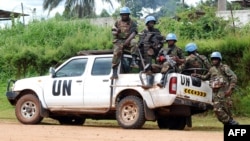Tanzania says it will promptly investigate allegations that several of its troops sexually abused women and girls in the Democratic Republic of Congo, where its soldiers are U.N. peacekeepers.
“Our political and military authorities recognize the implications and seriousness of such charges,” Ambassador Tuvako Manongi told a meeting of the General Assembly on Tuesday. He said a board of inquiry was being dispatched to investigate the allegations.
The Tanzanians are part of the 18,000-strong U.N. peacekeeping force known as MONUSCO, which operates in eastern DRC. They participate in an elite “intervention brigade” that pursues armed groups. The troops accused of abuses are based near Beni, in North Kivu province.
Paternity claims
Last Friday, MONUSCO said it had received 11 allegations of sexual abuse by soldiers from the Tanzanian contingent. The U.N. confirmed Tuesday that six of the alleged victims were minors.
Pregnancies have resulted in all 11 cases, with seven babies having been born and four females still pregnant.
The Tanzanian envoy said all implicated personnel had been confined to their camp in the DRC.
“Following the outcome of the investigation, and in compliance with the secretary-general’s ‘zero-tolerance policy,’ prosecution and disciplinary measures will be taken — including dismissal from the military upon completion of applicable penalties,” Manongi said.
Pattern of abuse
The accusations against the Tanzanian peacekeepers are the most recent in a series of rape and money-for-sex allegations against U.N. and non-U.N. troops, most based in Africa.
The U.N. mission in the Central African Republic has been plagued by abuse allegations. Last month, the mission said it had received reports of a hundred cases that had taken place between 2013 and 2015. Peacekeepers from Burundi and Gabon and French Sangaris forces were implicated.
The U.N. and troop contributors are investigating those charges, which include abuse of minors and, in one disturbing instance, allegations of a French commander tying up young girls and forcing them to have sex with a dog.
U.N. Secretary-General Ban Ki-moon recently appointed Jane Holl Lute, a former American official with extensive experience in U.N. peacekeeping, to coordinate the organization’s response to the abuse problem.
“We must change our thinking,” Holl Lute told the General Assembly. “There is not a family, a school, a church, a military, an organization or a government on this planet that doesn’t face this problem.”
Holl Lute said the number of abuse cases must be “measurably reduced” and assistance must be quickly given to victims. After addressing the session, she left for the CAR and DRC.
Accountability
The U.N. has more than 100,000 troops and police from 122 countries, working in 16 operations, most in very difficult and dangerous environments. In 2015, there were 69 reported cases of sexual abuse or exploitation against peacekeepers in nine current and one closed mission.
The U.N. cannot prosecute troops under its command; it is up to their national governments to do so. In many past instances, peacekeepers have gone unpunished at home.
Under new measures, the U.N. secretary-general can repatriate entire contingents from countries where there is evidence of widespread or systemic sexual exploitation or abuse by their troops. That could bar them from future lucrative peacekeeping work.




